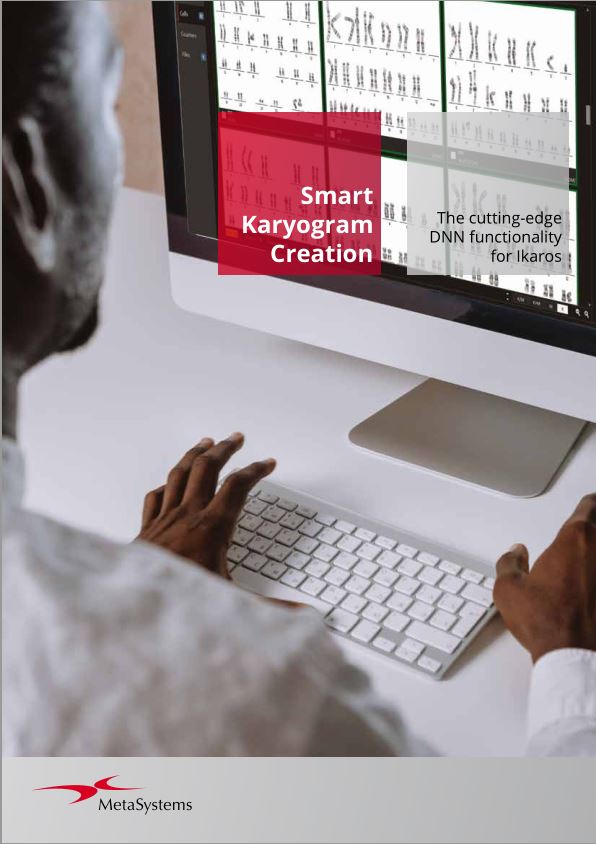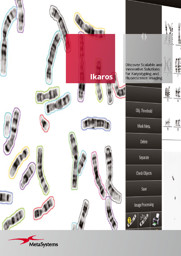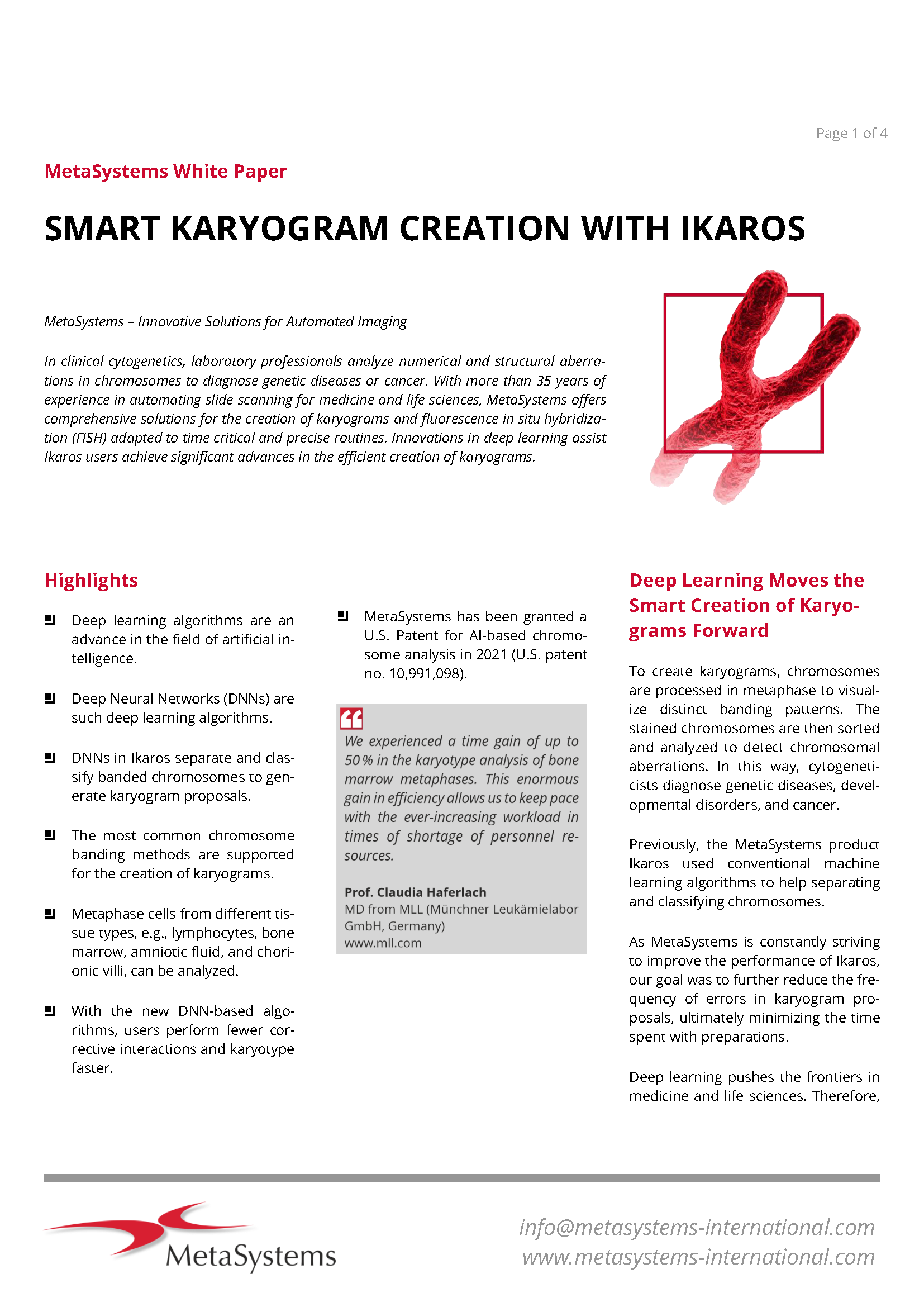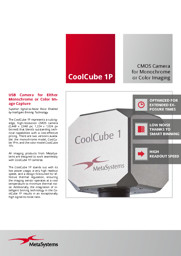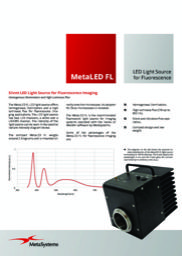Ikaros
Discover Scalable and Innovative Solutions for Karyogram Creation and Fluorescence Imaging
Ikaros is a software for the generation of karyograms with real-time microscope images from cultured and stained cell specimens in their metaphase. By transferring images of chromosome spreads from the microscope to a computer the labor-intensive manual processing of photographs is eliminated. Karyograms are assembled by the operator with the support of image processing software. The results are documented in hardcopy and archived for later review.
The color fluorescence mode allows fast and easy acquisition, processing, archiving, and documentation of microscopic fluorescent images. All the steps from image acquisition to color printouts can be performed in just a few minutes. Images can easily be exported directly to other graphics and presentation software, which adds flexibility and convenience.
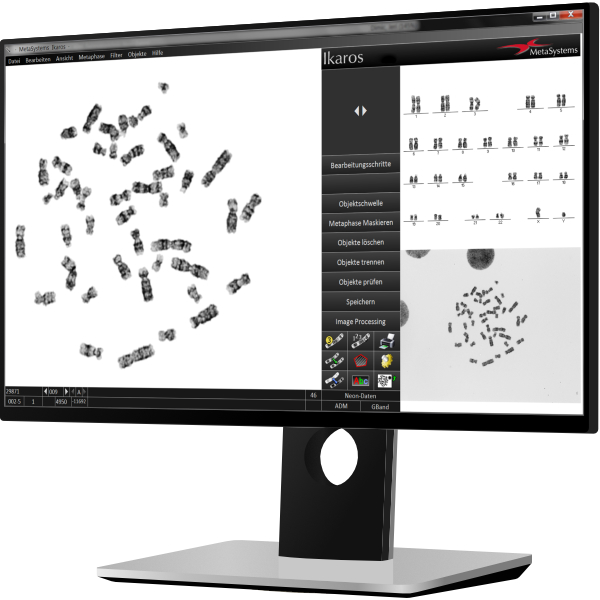
Karyogram Creation
- Accommodate a diverse array of banding techniques currently in use.
- Utilize various specimens for banding analysis, including amniotic fluid, peripheral blood, chorionic villus, bone marrow, and tissue, without limitations based on specific diseases.
- Incorporate numerous features to support your interpretation of metaphases and streamline your karyogram creation process.
- Maintain a continuous log of processing steps and enjoy unrestricted access to the original images.
- Facilitate smooth transitions between different capture settings, allowing for effortless shifts from brightfield to fluorescence and vice versa.
- Choose the option for manual image acquisition with one-click capture, automatic contrast enhancement, and the selection of the optimal focus plane.
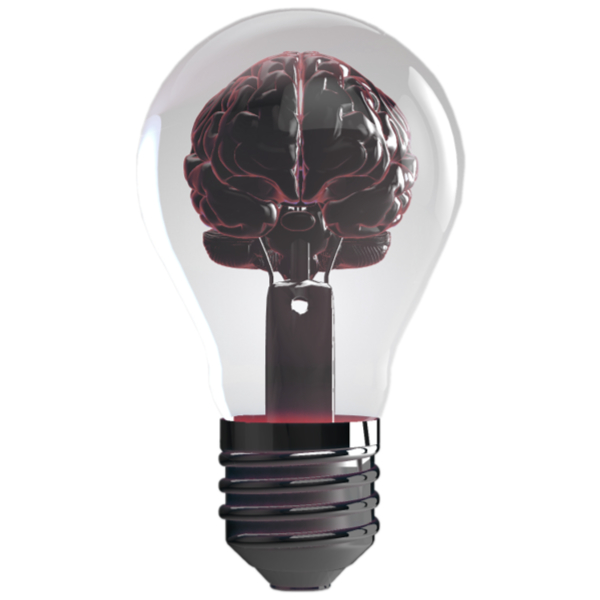
Deep Neural Networks (DNN)
- Creation of karyograms utilizing Deep Neural Networks (DNN) supersedes the machine learning tools used in earlier versions.
- Chromosome separation in unprocessed metaphase images facilitated by DNN technology, with the goal of minimizing the need for manual intervention.
- DNN-based chromosome assignment resulting in a karyogram draft that serves as a working basis for the adjustments and the evaluation performed by the experienced professional.
- A more efficient workflow that has the potential to significantly decrease the amount of manual effort and time required to prepare the karyogram.
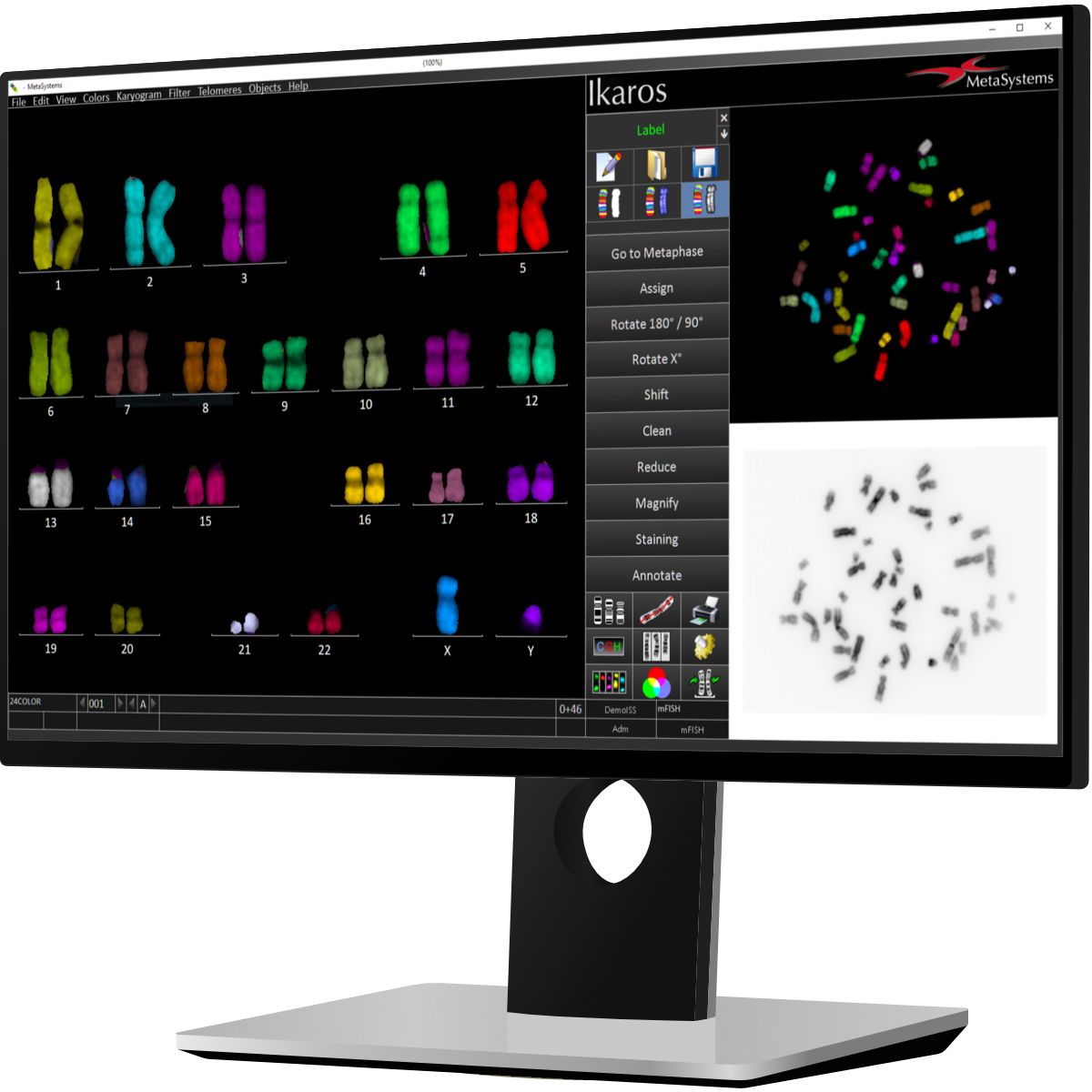
Color Mode
- Effortlessly capture images with a single click, utilizing up to 12 color channels.
- Get correct exposures at the first shot, thanks to automatic integration time.
- Eliminate the need for time-consuming processing in a dark room.
- Utilize a monochrome camera for the independent acquisition of single-color channels, automatically merging them to create a color image.
- Refine and edit specific color channels or even individual areas within the image with selective editing capabilities.
- View individual color separations and explore various pseudo-color visualizations.
- Maintain a continuous log of processing steps and enjoy unrestricted access to the original images.
- Opt for optional upgrades to enable support for color karyotyping, Multicolor FISH (mFISH) and the exclusive Multicolor Chromosome Banding (mBAND) method.
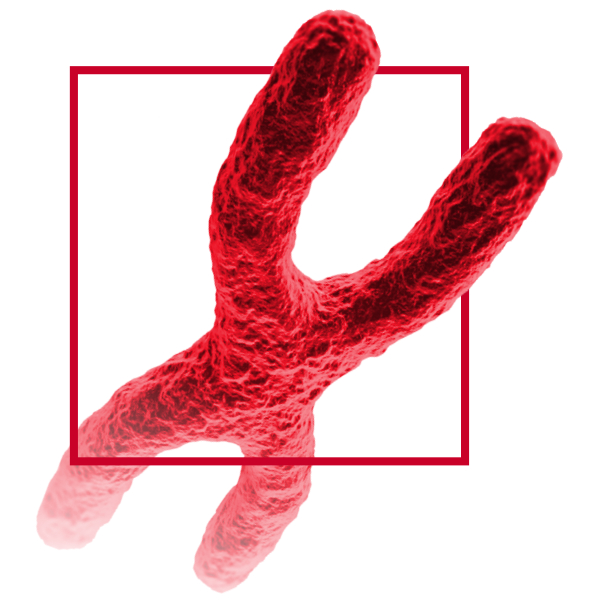
The Ikaros software integrates an intuitive graphical user interface with a range of potent processing tools, delivering the necessary flexibility in the process of karyogram creation. Engineered to reduce the number of interactions, Ikaros holds the potential to decrease the time needed for both analysis and result review compared to a manual workflow.
Ikaros offers tools to assist cytogeneticists in evaluating metaphases prepared using various prevalent chromosome banding methods (such as G-Banding and Q-Banding). It also supports diverse specimen types, including peripheral blood, bone marrow, amniotic fluid, and chorionic villi.
Moreover, Ikaros introduces a color fluorescence mode, displacing traditional photography and eliminating the time-consuming and laborious processing steps typically performed in a darkroom. Color images are produced by sequentially capturing monochrome images of the distinct color components and then automatically combining them to form a cohesive color image. The automated integration time control guarantees accurate exposures from the initial shot, eliminating the need for cumbersome test exposures or guesswork in determining the correct integration time. This not only reduces hands-on time but also extends the lifespan of the specimen. Even faint fluorescent signals against a strong counterstain result in clear and sharp images.
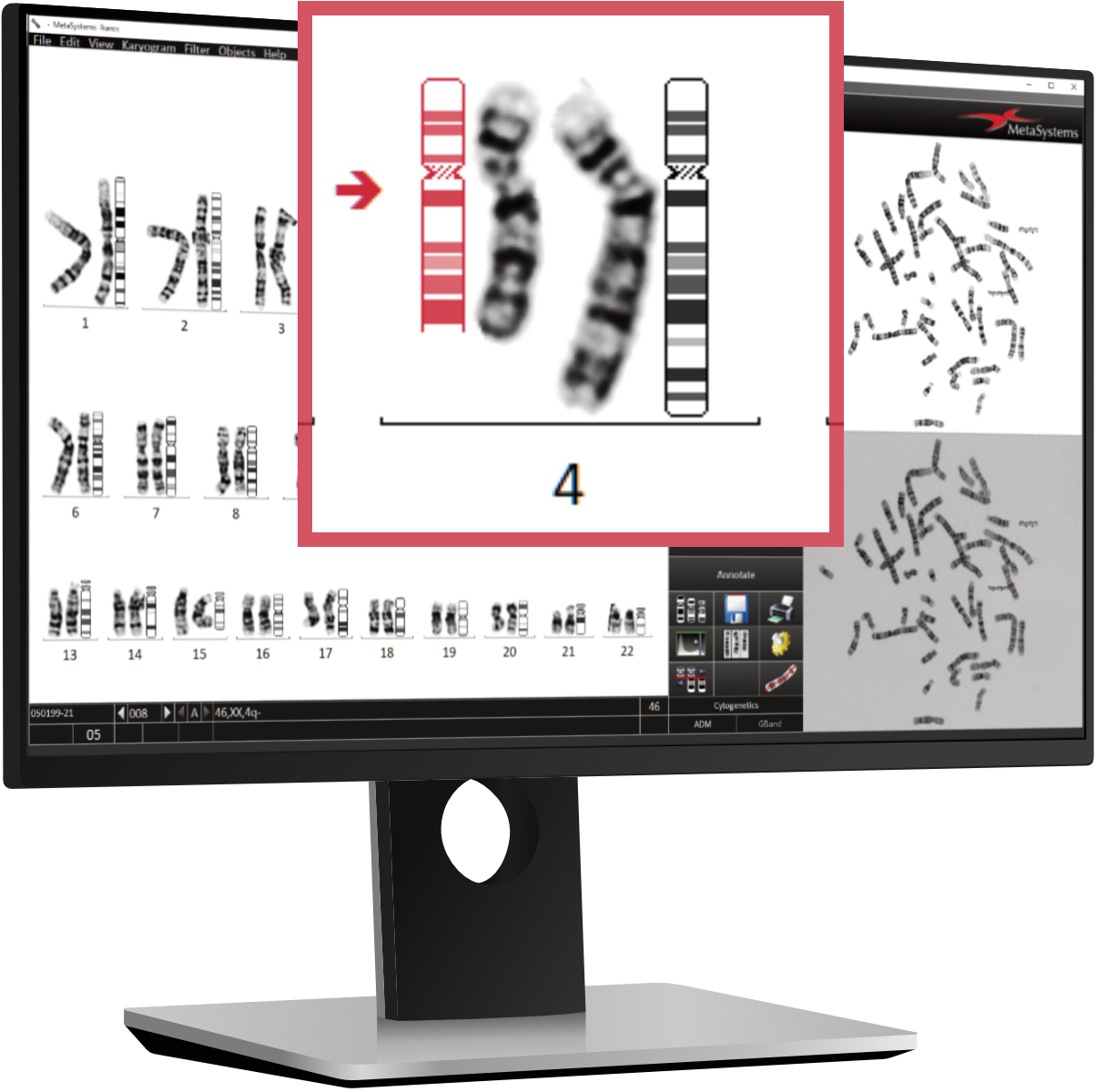
DNN-Based Karyogram Creation
The latest versions of Ikaros by MetaSystems have integrated features based on Deep Neural Networks (DNNs), designed to assist cytogeneticists in segmenting metaphase chromosomes and classifying them within the karyogram. This cutting-edge technology supersedes the respective algorithms used in earlier versions of Ikaros, offering the potential to markedly decrease the number of interactions needed in comparison to the former workflow.
Like its predecessors, the latest versions of Ikaros support users in separating chromosomes in the metaphase. However, the adoption of a DNN-based workflow marks a notable progression in this process, aiming to lower the rate of segmentation errors and consequently lessen the need for manual corrections by the users.
This introduces the deployment of the new DNN-based tools as an additional means to achieve time savings in metaphase processing.
In the process of karyogram creation, another traditionally laborious task is the classification of chromosomes into their appropriate classes on the karyogram form. DNN technology also aids in this step, reducing the need for manual input and corrections. As a result, cytogeneticists are presented with an initial karyogram draft. This draft serves as a working basis for the adjustments and evaluation performed by the experienced professional.

Q&A
Question: Does the new Ikaros equipped with DNN capabilities fully automate the creation of karyograms?
Answer: No. In the new Ikaros, the DNN capabilities facilitate the segregation of chromosomes and their categorization into the appropriate karyogram classes. This process yields a preliminary suggestion that requires further assessment and potential modification by a skilled user. Ultimately, the cytogeneticist is responsible for creating the final karyogram and conducting its analysis.
Question: Can I change the results of the DNN-based chromosome segregation and assignment?
Answer: Yes, once Ikaros generates a karyogram proposal via its DNN features, users have the possibility and the responsibility to review and, if needed, amend this proposal. They have access to the same respective tools that have been present in earlier versions of Ikaros. Nevertheless, when an appropriate DNN is utilized, it is anticipated that the need for manual adjustments will be considerably reduced compared to the machine learning algorithms used in prior versions.
Question: How much time will the new DNN-based functions save me per case or per karyogram?
Answer: The response to this inquiry is contingent on various elements. Factors such as the nature of preparations, working methods employed, and the time allocated for result verification and reporting all play crucial roles in determining processing time. Nonetheless, insights from laboratories that have adopted the new feature indicate a noticeable decrease in case processing times, attributed to the diminished requirement for manual intervention in contrast to the algorithms previously in use.
Question: Is it necessary to replace my current Ikaros installations to access the new functionalities?
Answer: No, there is no need for a replacement. Starting with version 6.3, every new version of Ikaros comes ready for DNN-based chromosome separation and classification and can be upgraded to include this feature. For efficient handling of DNN operations, an additional graphics card is needed to facilitate the computations. This card can be installed directly in the workstation or in a distinct system. For further information on the technical options available, please feel free to get in touch with us.
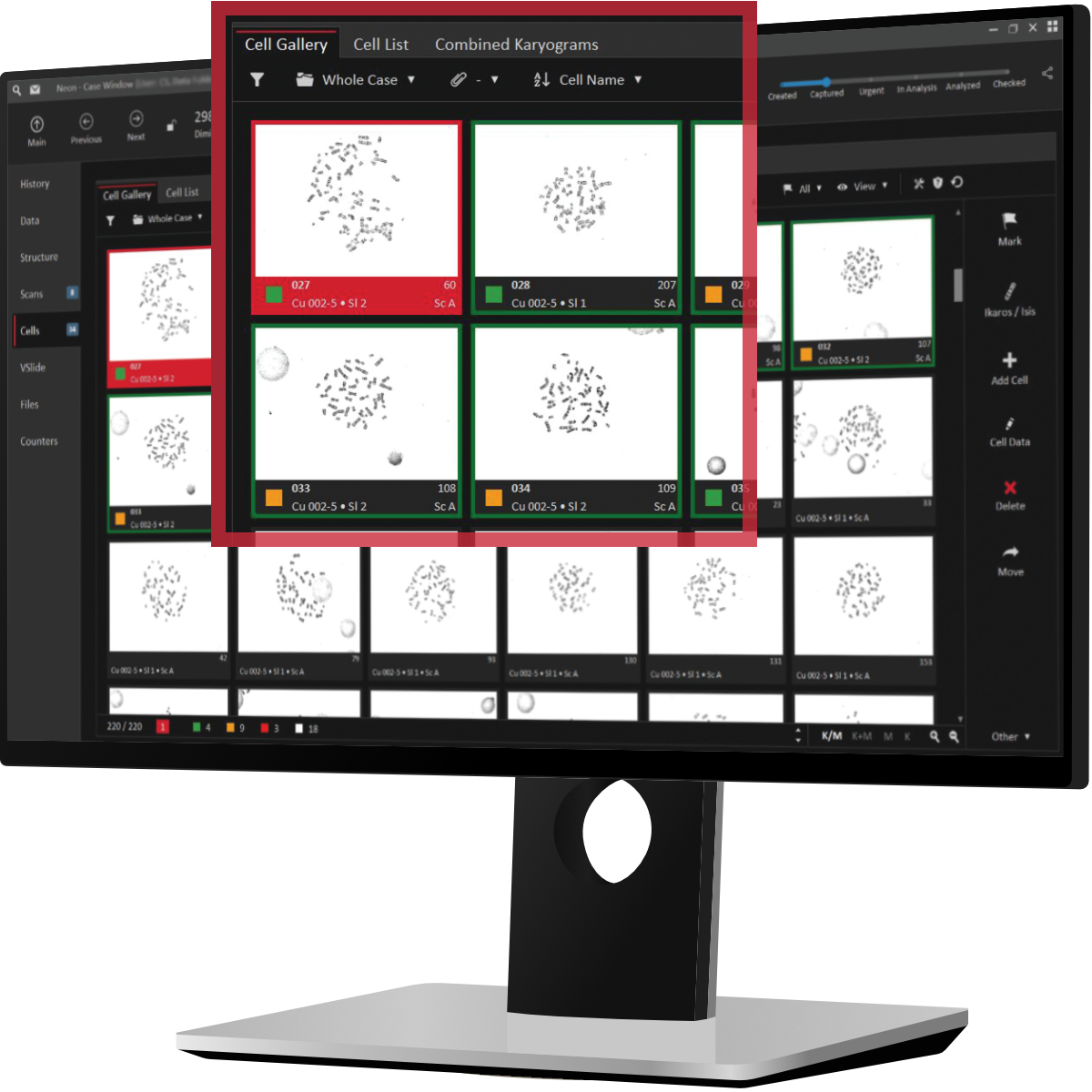
Neon is a convenient interface for organizing case and image data. Users configure overview dashboards to summarize cases, processing statuses, and case statistics. Interfaces for data exchange with external databases can be adapted. The fields on case data sheets and reports are customizable to meet specific needs.
Neon serves as general data management software.
While Ikaros can be utilized as a standalone installation, its optimal performance is demonstrated in an environment where multiple workstations collaborate to create an integrated imaging solution. Consequently, Ikaros can be seamlessly integrated into various setups, including karyogram creation stations (Ikaros Karyo M), fluorescence imaging stations (Ikaros BASE C and Ikaros Karyo C), data management stations, or review stations (Ikaros Review). With MetaSystems solutions, the scalable multiuser network can be expanded at any time to accommodate growing demands.
When paired with the Metafer software for image acquisition and the detection, classification, and counting of cells, collaborative workspaces can be established, blending performance with high user convenience and robust data security.
Functions that were previously offered as Isis have been merged into the new overall package of the Ikaros software. When updating an existing system, we will of course adapt your licenses so that the range of functions does not change to your disadvantage.
Ikaros 6.3 is classified as an in vitro diagnostic (IVD) medical device in the European Union in accordance with the In Vitro Diagnostic Medical Device Directive 98/79/EC. It carries the CE label unless otherwise indicated and must be used within the scope of its intended purpose.
Ikaros is utilized in numerous countries worldwide. However, its use for clinical diagnostics depends on the regulatory requirements of each respective country or region.
Some hardware components supplied by third-party manufacturers are not included in the Ikaros IVD product and are therefore not part of the IVD medical device.











